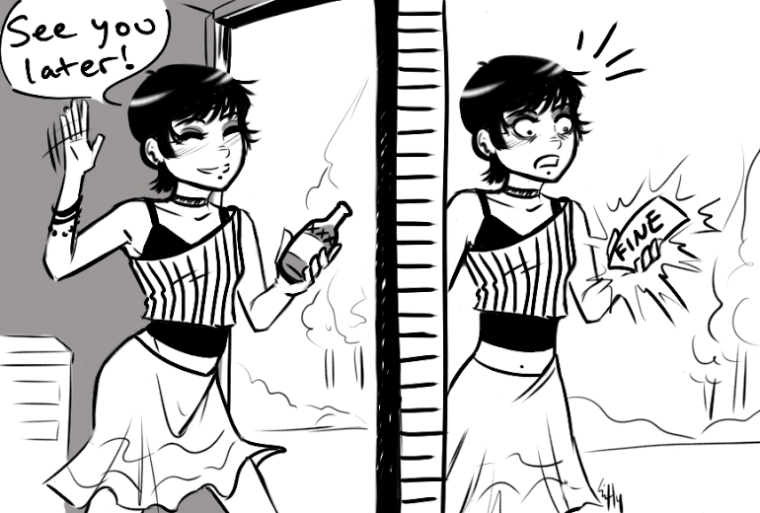While I was walking around downtown this past weekend, the Trolley Pub whizzed by. All the patrons were drinking, pedaling and having a good time. A pedal-powered bar on wheels really is a novel idea.
However unique Trolley Pub may be though, it does beg the question: If numerous people biking around, sitting at a bar and drinking is legal, why can’t I walk down the street with a beer in my hand without risking an open container or public intoxication violation?
This just doesn’t make sense. Are all the college kids and other Raleighites hanging around outside with an alcoholic beverage in their hands really menaces to society? That’s what the presence of police officers stationed outside practically every bar downtown would lead you to believe.
North Carolina has a vast number of laws regarding alcohol. You can’t have an open container in your car regardless of whether you’ve been drinking, but you can drink if you’re a passenger in a taxi. You can be intoxicated in public so long as you’re not disruptive. You can’t have a beer before you turn 21.
So why do we have all these laws? Surely there’s a method to this madness. Alcohol consumption regulations tend to concentrate on keeping the peace and ensuring public safety.
As anyone who has ever gone for a drink downtown probably knows, drunk people can get disorderly pretty quickly. But are they really causing that big of a problem?
Who even gets to decide what is disorderly? According to CriminalDefenseLawyer.com, a drunk-and-disorderly citation can be given for blocking traffic or the sidewalk, fighting, begging, cursing or insulting others and can result in a $200 ticket and up to 10 nights in jail.
There has to be a better way to maintain the flow of traffic and keep people from shouting at each other than fining every drunk college kid stumbling around Raleigh yelling “Go Wolfpack!” Regulations of this nature can have a rather unfavorable impact on our city’s young people. That $200 public intoxication ticket seems pretty steep when you’re already paying tuition.
Not only that, but the accompanying misdemeanor violation can stay with you, potentially denying you from future opportunities. That’s a harsh punishment to give a student who was just enjoying his or her night out a bit too much.
If public-intoxication laws are intended to keep people from disrupting the peace, maybe the police should just turn their sirens off and let people enjoy themselves. A police siren screaming down the road causes more noise pollution than a mob of drunken college kids.
What about public safety? Drinking and driving is not something we want people doing, and we probably don’t want young people drinking copious amounts of liquor. If safety is the goal of public-intoxication laws, there are better ways to promote responsible drinking habits than constant monitoring and threats of punishment.
Do we really want to penalize college kids for drinking and having a good time with their friends? That bad mark on their record could stay with them for the rest of their lives unless they have the money to expunge it. The sheer fact that our drinking age exceeds that of most other countries baffles me, especially considering the consequences associated.
When I studied abroad in Copenhagen, where you can buy beer at age 16 and spirits at age 18, I experienced a culture in which drinking in public was not frowned upon. I could drink a beer on the walk from my residence hall to the metro, on the metro and on the walk to the club.
The fact that we have a higher drinking age and more alcohol regulations than Denmark implies that one of us must be wrong. Our higher drinking age and stricter treatment of alcohol consumption would lead one to believe that these restrictions are necessary to keep the peace and ensure the safety of the general population.
If that’s the case, are all of the Danish teenagers and university students miscreants and drunken low-lifes because they were allowed to drink earlier? I certainly didn’t think so—quite the opposite in fact. Danish students tended to hang out with their friends in public parks, at bars or clubs, or sit around in the city square and have a couple beers. Sure, the downtown district got slightly noisy when the bars let out, but that doesn’t mean the cops need to swarm the place.
Are we really that much better off than the rest of the world for restricting the consumption of alcohol? Is the best way to teach our youth to moderate alcohol consumption through fear tactics and steep punishments? I don’t think so either.
Whew, that got a bit heated at the end. Somebody get me a beer.











